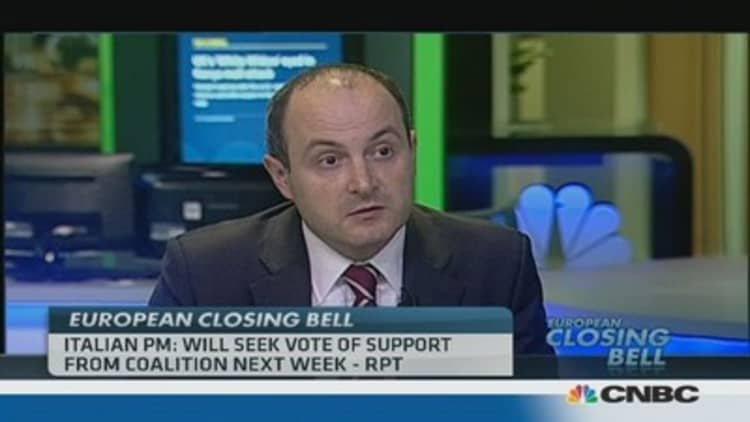Just as you thought the crisis mode in Europe was over and markets seem to be enjoying confidence and stability, along comes another curve ball, served up by Italian politicians.
Center-right leader Silvio Berlusconi pulled his ministers out of the cabinet on Saturday, effectively bringing down the government of Prime Minister Enrico Letta and leaving the euro zone's third-largest economy in chaos.
(Read more: Italian government collapses as Berlusconi ministers resign)
According to Nicholas Spiro, managing director of Spiro Sovereign Strategy, while markets have grown accustomed to "Italy's dysfunctional politics," there's a sense that things are now spinning out of control, with potentially dangerous consequences for both Italy and the euro zone.
"(Saturday's) resignations of the five ministers from Silvio Berlusconi's Forza Italia party from the conflict-ridden government of Premier Enrico Letta sounds the death knell for the five-month-old 'grand coalition,'" Spiro wrote in a note Sunday.
"Mr. Letta's cabinet is unable to govern—indeed it's questionable whether it ever did," he said.
Italy, which is the world's third-largest bond market, matters more than any other euro zone peripheral economy, Spiro noted.
"In the minds of investors, the euro zone crisis has always been about two countries: Italy and Spain," he said. "If either one suffers a major crisis, markets are more likely to take fright."
"The big difference now is that the (European Central Bank's) bond-buying program continues to suppress Italian and Spanish borrowing costs, while markets have chosen to focus on signs of an economic recovery in the euro zone," Spiro added.
(Read more: Europe shares close down as Italian crisis persists)
On Sunday, Italy's economy minister tried to play down the potential market impact of the latest developments, saying investors have already factored in the country's political instability.

"The markets will take account of many things including the economic outlook which is clearly improving. ... I hope that as of Monday this trust (by the markets) will be confirmed," Fabrizio Saccomanni told financial daily Il Sole 24 Ore hours after a political crisis left the government paralyzed.
Indeed, some economists agree that Italy's economy should remain shielded from any political dramas for now.
"The economic situation is so much better now than it was when Monti took over," said Erik Nielsen, chief economist of UniCredit, referring to further sharp improvements in Italian consumer and business confidence in the past week.
"A good thing it is that so much balance sheet adjustment (fiscal and current accounts) and so many fundamental reforms took place these past two years, significantly reducing the need for urgent measures now," he added.
According to Michael Ivanovitch, president of MSI Global, while it's unlikely that Italy can avoid another election, he doesn't see this as a threat to the euro, and maintains that the region remains an attractive investment destination.
"The euro is safe. The European Central Bank stands ready to provide emergency backstops and easy credit terms to support the incipient euro area recovery," Ivanovitch wrote in a column for CNBC.com.
(Read more: Euro zone moving from economic to political crisis)
Still, analysts expect some market volatility as the Italian theatrics continues to play out in the coming weeks.
"The price that Mr. Letta's government has paid for relying on the wavering support of Mr. Berlusconi's increasingly populist and euro-sceptic party has been a heavy one: A loss of fiscal credibility and a further tarnishing of Italy's image abroad," said Spiro. "The whiff of further rating downgrades is in the air."
—By CNBC's Li Anne Wong. Follow her on Twitter @LiAnneCNBC

